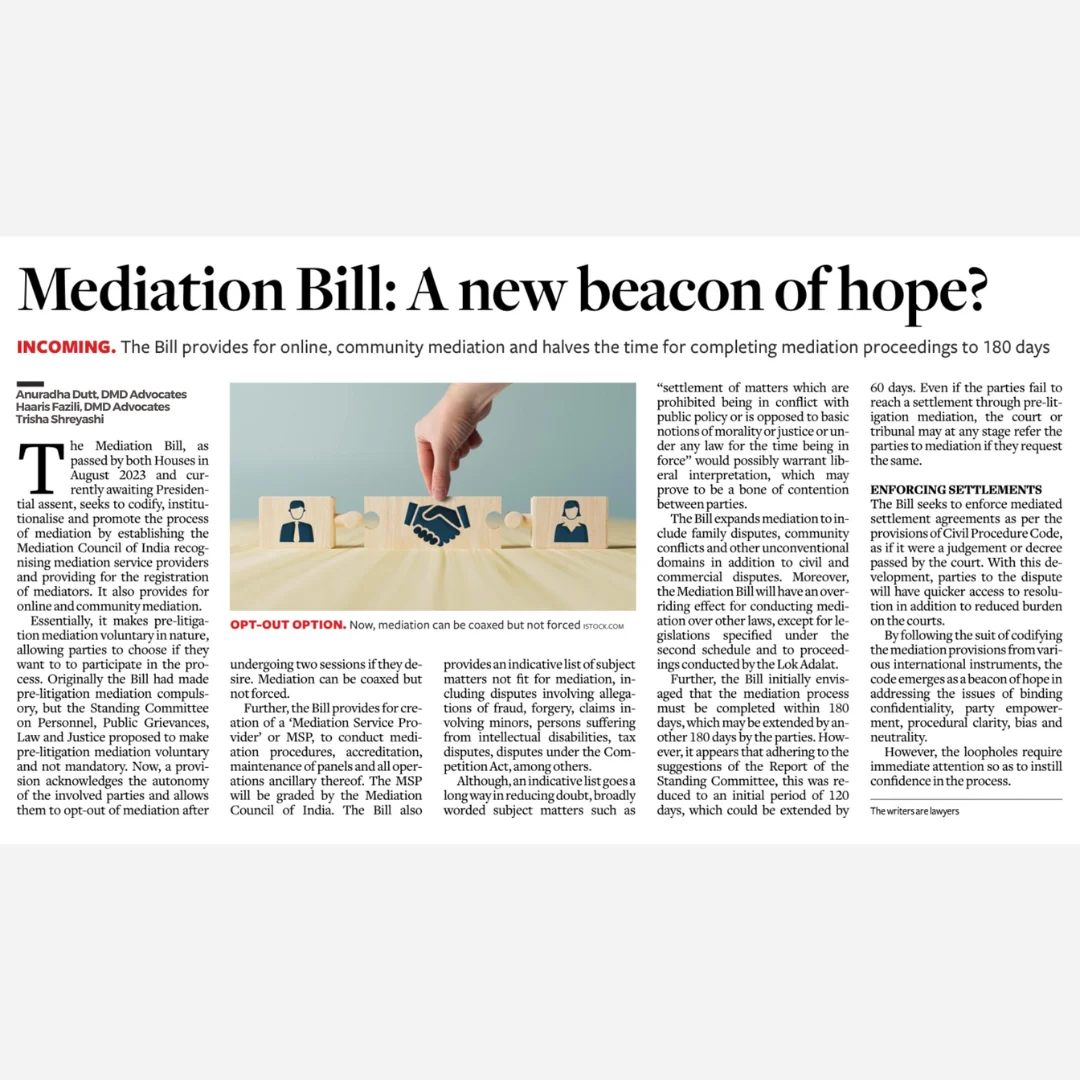Publications
Delhi High Court Upholds Constitutional Validity of Anti-Profiteering Provisions in GST
02 Feb 2024
- DMD Advocates
- Article
The Hon’ble Delhi High Court (High Court) in a batch of writ petitions filed by companies aggrieved against orders/notices by the National Anti-Profiteering Authority (NAA), spanning across various sectors, has upheld the constitutional validity of the provisions pertaining to anti-profiteering under Goods and Services Tax (GST), i.e., Section 171 of the Central Goods and Services Tax Act, 2017 (CGST Act), along with Rules 122, 124, 126, 127, 129, 133 and 134 of the Central Goods and Service Tax Rules, 2017 (CGST Rules). The key findings of the High Court have been succinctly captured as under:
On legislative competence: The High Court held that Article 246A of the Constitution empowered the Legislature to make laws ‘with respect to’ GST. The phrase ‘with respect to’ was of wide amplitude and confers broad authority, thereby, conferring the power to legislate on all ancillary, incidental and necessary matters which are related to GST. Thus, Section 171 of the CGST Act was within the legislative competence of the Parliament under Article 246A of the Constitution.
On excessive delegation of legislative powers: The High Court held that Section 171 of the CGST Act clearly outlined the legislative policy of passing the benefit of ‘commensurate’ reduction in prices to consumers when there was ‘any reduction’ in rate of tax or benefit of Input Tax Credit (ITC). The word ‘commensurate’ denoted equivalence or proportionality as recognized in various Supreme Court judgments. Thus, the power of the NAA to determine procedure and methodology stemmed from Section 171 itself, which did not delegate any essential legislative function. The High Court observed that the powers conferred on NAA by way of Rule 126 of the CGST Rules were intended by the Legislature to be exercised by NAA itself. Thus, the principle of delegatus non potest delegare was not applicable to the present case.
On violation of Article 14 of the Constitution: The High Court, rejecting the Petitioners’ argument that NAA’s discretion in determining profiteering was unbridled, held that no standardized methodology or mathematical formula can be laid down for determining profiteering due to varying industries and case specific facts. The methodology adopted by NAA was fair as long as it aligned with the broad principles outlined under Section 171 of the CGST Act. The High Court, affirming Petitioners’ contentions, held that the method adopted by NAA for determining profiteering in real estate industry, based on credit-to-turnover ratio, was flawed. However, the Court held that any inconsistencies in NAA’s approach in computing profiteering may render its orders invalid but this would not invalidate Section 171 of the CGST Act.
On violation of Article 19(1)(g) of the Constitution: The High Court held that Section 171 of the CGST Act did not contravene Article 19(1)(g) of the Constitution since it pertained solely to indirect tax element of goods and services and did not infringe upon the freedom of the supplier to set prices on the basis of relevant commercial and economic considerations. The Court observed that wherever commercial factors necessitated price increase despite tax reductions, the suppliers were required to justify for offsetting reductions and not circumvent their obligation to reduce prices in a commensurate manner.
On comparison with anti-profiteering provisions of Australia and Malaysia: The High Court opined that the Petitioners’ comparison of Section 171 of the CGST Act with the anti-profiteering provisions in Australia and Malaysia was misguided as these provisions were essentially price control mechanisms and are not akin to anti-profiteering provisions enshrined under the CGST Act, which concerned itself with only indirect tax component of goods and services.
On time period during which reduced prices must be maintained: The High Court held that providing for a specific time period up to which the reduced prices must be maintained would not be in conformity with the scheme and intent of the CGST Act. The price reductions must be implemented as long as there exists a direct relation with the reduction of tax rate or benefit of Input Tax Credit (ITC), without any other factors offsetting the reduction.
On alternate methods of price reduction: The High Court held that legislative prerogative dictates the manner in which the tax reductions or ITC benefits are to be passed on to consumers. The suppliers cannot substitute price reduction with other forms like increase in volume, festive discounts, or cross-subsidization. The benefit of tax reduction must be passed on at the level of each Stock Keeping Unit (SKU) to each buyer and the profiteering amount be calculated accordingly for each SKU. Additionally, requiring the benefit of tax reduction to reach consumers by way of ‘cash in hand’ does not infringe any fundamental or other right.
On appeal: The High Court held that there is no vested right of appeal and whether to provide for an appeal or not was a pure question of legislative policy. There is no inherent or natural right to appeal. Furthermore, the orders of the NAA were subject to judicial review before jurisdictional High Courts under Article 226 of the Constitution of India.
On absence of judicial member in NAA: The High Court held that the issues for examination by the NAA primarily involve fact-finding tasks. Thus, it requires domain experts to perform their duties as outlined under Section 171(2) of the CGST Act and Rule 27 of the CGST Rules. The court observed that several statutory bodies, exercising quasi-judicial functions, do not require judicial members such as the Securities and Exchange Board of India (SEBI), Telecom Regulatory Authority of India (TRAI), Institute of Chartered Accountants of India (ICAI), etc. Regarding the issue of grant of casting vote to the Chairperson, the Court, in agreement with Petitioners’ submissions, held that allowing the Chairman a casting vote in case of a tie is deemed to be impermissible. However, since the said provision has not been used, the Court refrained from delving into a deeper discussion on this issue.
On time period for issuance of order: The High Court held that the time limit prescribed under Rule 133 for issuance of the order by NAA was directory rather than mandatory. The provisions did not provide for any consequences in case the time limits provided thereunder are lapsed. Furthermore, the Court held that beneficial legislation, such as anti-profiteering provisions, are enacted in the public interest. Thus, it should be construed liberally owing to larger consumer welfare.
On the scope of investigation by Directorate General of Anti- Profiteering (DGAP): The Court held that Rule 129 of the CGST Rules, by using the word ‘any’ conferred wide investigative power to DGAP encompassing all supplies of goods or services. The Court further observed that consumer ignorance or complexity in the supply chain cannot hinder the objective of a consumer welfare regulation.
On levy of interest and penalty: The High Court held that Section 171 of the CGST Act was broad enough to empower the Central Government to prescribe interest and penalty to dissuade the suppliers from benefits intended to be passed on to consumers. Thus, Rule 133(3)(b) & (d) of the CGST Rules, which empowered the authorities to levy 18% interest and imposition of penalty, fell within the rule-making power of the Central Government.
On comparison with pre-GST era taxes: The High Court rejected the Petitioners’ argument that the provisions of Section 171 of the CGST Act applied only in cases where there was reduction in rate of Goods and Service Tax (GST) or a grant of ITC under the GST Acts. It held that comparing pre- and post-GST era taxes aligned with the objective of the CGST Act.
Concluding remarks
The High Court, in the batch of writ petitions, restricted itself to only deciding the plea against the constitutional validity of Section 171 of the CGST Act and Rules 122, 124, 126, 127, 129, 133, and 134 of the CGST Rules. The Court itself acknowledged that there may be instances of arbitrary exercise of power under the anti-profiteering mechanism, and in such cases the appropriate remedy would be to set aside the orders on merits.
It is open for the affected parties to approach the Hon’ble Supreme Court against the judgment passed by the Delhi High Court on the aspect of the constitutional validity of the relevant provisions. However, in cases where the orders passed by NAPA are patently perverse, arbitrary, or lacking reason, the parties may choose to contest the same before the regular Bench of the High Court itself.
Some of the key issues raised by the Petitioners before the High Court touch upon the basic tax and legal jurisprudence of the land and it would be interesting to watch for any further developments in this regard.
Credits: Shashank Shekhar (Partner), Tushar Joshi (Principal Associate) & Ishant Sharma (Associate)




























